Tatiana Byzova Laboratory
-
Tatiana Byzova Laboratory
- Principal Investigator
- Research
- Our Team
- Publications
- Patents
- Careers
- Research News

Tatiana Byzova, PhD
Staff
Robert Canova Chair in Angiogenesis Research
Email: [email protected]
Location: Cleveland Clinic Main Campus
Research
The Byzova Lab investigates how blood vessels function in adulthood and development, how normal and healthy vasculature is preserved and what methods control vascular growth in adults. The major objective of our research program is to fully integrate the mechanistic studies performed at the molecular and cellular levels with complex in vivo models of human diseases to yield a complete understanding of fundamental problems in physiology and pathophysiology.
The lab conducts research on vascular and inflammation-associated pathologies including:
- Angiogenesis in wounds, cancer, ischemia
- Vascular dysfunction in aging and neurodegenerative diseases
- Cancer and inflammation-associated vascular pathologies and thrombosis
Our methods include innovative ex vivo and in vitro cell and molecular biology, advanced imaging, analysis of model and clinical samples in collaboration with experts from structural biology, organic chemistry, and bioengineering. We collaborate with experts in structural biology, organic chemistry and bioengineering.
One of our team’s main interests is neoangiogenesis, or new blood vessels developed from existing vasculature. Neoangiogenesis governs pathological and adaptive vasculature development in adults. Its processes are crucial in tissue recovery from ischemia, a response that is triggered in a variety of pathogenic settings including the complications of thrombosis, injury and wound healing, and cancer progression and tumor metastatic spread. Our lab also has a rich background in investigating cancer and inflammation-associated thrombosis. We have been working for years on cancer thrombosis and on the mechanisms of tumor communications with various organs, including premetastatic and metastatic interactions.
Hear more on Cleveland Clinic's "Cancer Advances" podcast: Innovations ahead: Decreasing Thrombosis in Patients with Cancer
Biography
Dr. Byzova joined Cleveland Clinic in 1996 after completing her PhD at Moscow’s National Cardiology Center in collaboration with Baker Cardiovascular Institute, Melbourne, Australia.
Among Dr. Byzova’s contributions to science is discovering Kindlin-3 (LAD-III) deficiency disorder, a novel human disease discovered and characterized in the lab. The genetic disease is a deficiency that leads to immune problems and severe bleeding. Dr. Byzova also pioneered research on toll-like receptors on non-immune cells, and on the novel oxidative pathways and their metabolites in aging-related diseases.
Dr. Byzova has a track record of mentoring and training successful researchers, with over 20 former trainees advancing to independent positions in academia and industry. She holds two active US patents for anti-angiogenic compounds and hair growth treatment and a pending application for the treatment of cancer-associated thrombosis.
Education & Professional Highlights
Cleveland Clinic Staff since 2000, R. Canova Endowed Chair in Angiogenesis since 2010.
Education & Fellowships
Postdoctoral training (1996-1999): Cleveland Clinic, Lerner Research Institute
PhD, Cell Biology: National Cardiology Center, Moscow, 1995
Thesis: "Cell adhesion molecules in human vascular cells"
MS - Moscow State University
"New inhibitory antibodies FraMon against IIb-IIIa integrin for clinical use”
Awards:
- Investigator award, International Society of Thrombosis and Hemostasis
- Judah Folkman Award for contribution to Vascular Biology
- Career Award in Thrombosis, American Heart Association
NIH and DOD service:
Charter member of Basic Biology of Blood, Heart and Vasculature Study section (present). Member of Cardiovascular Differentiation and Development study section, DOD prostate cancer panel and many others
Memberships
- American Heart Association
- American Society of Hematology
- American Association of Cancer Research
Research
Overview
Our lab's research focuses on the biology of blood vessels concerning inflammatory and neurodegenerative diseases. Specifically, we explore interactions between endothelial and immune cells in various developmental and pathological contexts: cancer, ischemia, injury, inflammation, Alzheimer's disease and ALS.
Our primary objectives include gaining a comprehensive understanding of these intricate processes, identifying potential therapeutic targets and devising effective treatments. Our approach integrates the mechanistic studies performed at the molecular and cellular levels with complex in vivo models of human disease, building in-depth understanding of fundamental problems in physiology and pathophysiology. We use structure-functional analyses of protein-protein interactions with a focus on cell adhesion.
We use organic chemistry and bioengineering approaches, mutagenesis and many other molecular biology techniques for our mechanistic studies. We employ state-of-the-art cell biology methods to identify and describe cell adhesion, communications and mechanosensing mechanisms. We generate genetically modified preclinical models (knockouts and knockins) to assess the importance of these specific molecular interactions and pathways in vivo. We also work with human tissues to move our discoveries to clinical application and to facilitate therapeutics design. This strategy ensures that research remains pathophysiologically relevant yet mechanistically based.
Cleveland Clinic collaborators
- Bruce Trapp, PhD, Neurosciences
- Eugene Podrez, MD, PhD, Inflammation & Immunity
- Olga Cherepanova, PhD, Cardiovascular & Metabolic Sciences
- Antoine Louveau, PhD, Neuroscience
- Mark Brown, PhD, Cardiovascular & Metabolic Sciences
- Matt Kalaycio, MD, Hematology Oncology
Innate immunity and vascular aging
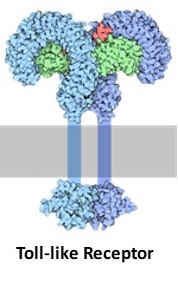 |
We investigate the role of endothelial Toll-like receptors (TLRs) in vascular development and diseases, with a particular emphasis on cancer. TLRs and innate immunity’s clinical importance is becoming increasingly clear in vascular development and diseases. Our discoveries of new endogenous TLRs ligands generated by lipid oxidation and their expanding functions in human pathologies underscore the importance of TLRs (TLR2 in particular) in cardiovascular and lung diseases. This is also important invascular pathologies associated with inflammation, such as retinal diseases of aging and diabetes. TLR2 expression is not restricted to the immune system; it is functional on other cells, including endothelium and can be activated by bacterial and endogenous ligands, i.e., products of lipid peroxidation. We aim to establish a role for endothelial TLR2 in angiogenesis using postnatal and developmental models. We use our own organic chemistry lab to synthesize and analyze novel products of lipid peroxidation which serve as TLR ligands. We also developed TLR2 conditional KO model in stem cells of hair follicle and will test the role of TLR signaling and its endogenous ligands in hair cycle, growth, wound repair and pathologies. |
Interplay between vasculature and immune cells in the central nervous system
We examine the dynamic interactions between vasculature and immune cells in the central nervous system, such as macrophages and microglia.
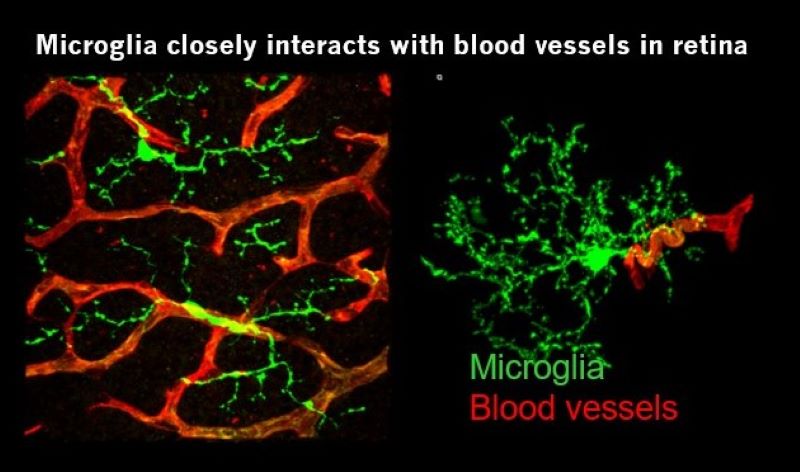
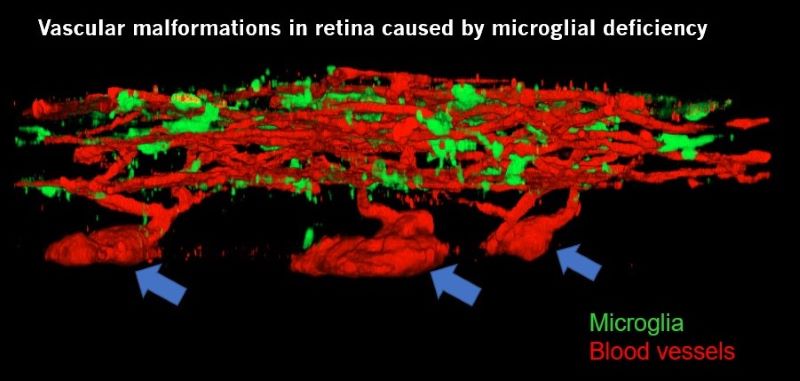
Vasculature is a key determinant for organism and organ development because of its function in health, disease and organ/tissue regeneration. Our studies aim to understand the nature of the crosstalk between vascular and resident innate immune cells (microglia) to normalize dysfunctional (insufficient or excessive) vasculature and to develop novel tissue regeneration and revascularization technologies. Basic functions of microglia play a key coordinating role in numerous pathologies from developmental abnormalities and behavioral problems to neurodegenerative disorders (Multiple sclerosis, Alzheimer’s disease) to HIV’s neuropathology. Knowledge on microglia in vivo is essential for the development of new treatments for multiple sclerosis, Alzheimer’s disease and other neuro- and retinal pathologies.
We continue to research Kindlin-3 and integrins. Using microglia-specific Kindlin3 and integrin knockouts, we show that Kindlin deficient microglia is characterized by deficient phagocytosis and deregulated production of angiogenic factors. Our new technologies are focused on the development of novel materials and approaches for tissue regeneration and microglia-controlled revascularization.
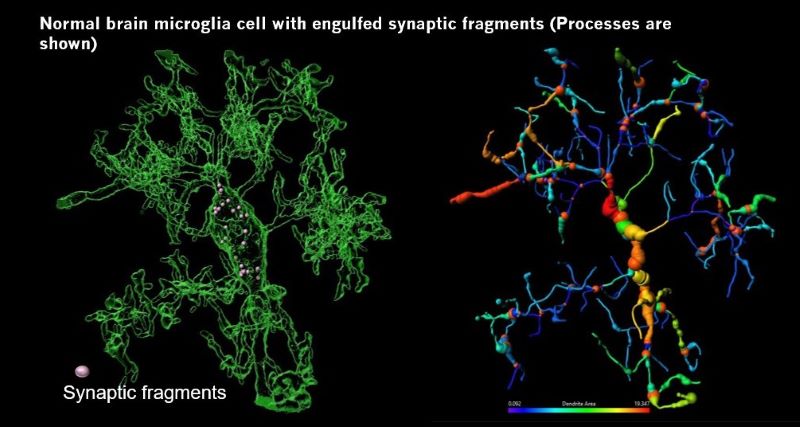
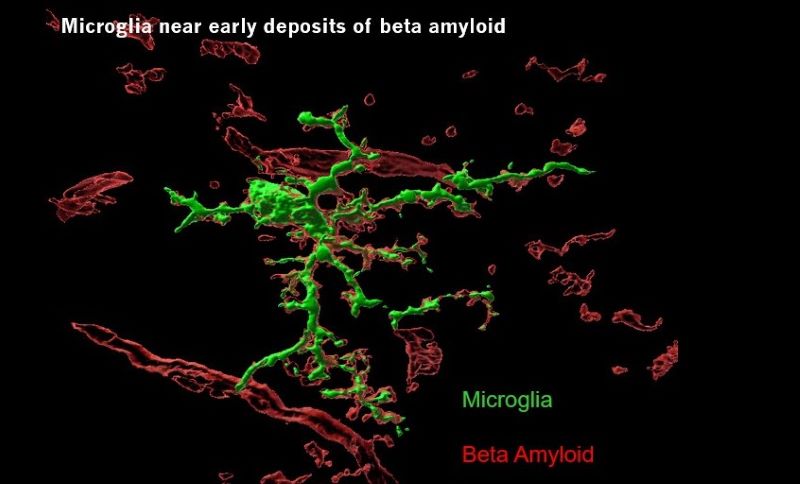
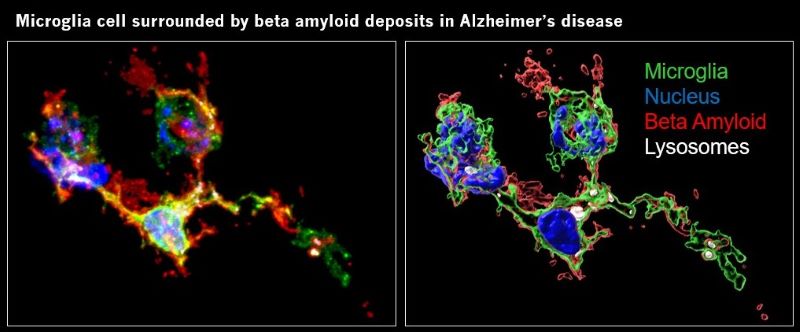
Oxidative stress in vasculature and neurodegeneration
We study novel oxidative pathways involved in pathological conditions and their implications in human aging and diseases like Alzheimer's disease. Additionally, we are working on developing precise technologies to mitigate the damaging consequences of excessive oxidation.
Part of our work focuses on a novel lipid peroxidation pathway that is distinct from a very common and relatively well-studied HNE pathway and its membrane-associated metabolites. First described for age-related macular degeneration and dyslipidemia, activation of this pathway occurs in several pathologies associated with oxidative stress, such as cancer, inflammation and neurodegeneration. The generation of reactive oxygen or nitrogen species is sufficient to oxidize polyunsaturated fatty acids (PUFAs) readily available within membranes, especially in the brain.
Oxidative stress is one of the main features and causes of neurodegeneration, exemplified by Amyotropic Lateral Sclerosis (ALS) and Alzheimer’s disease. We demonstrated the presence of final products of this pathway, i.e., carboxyalkyl pyrroles (exemplified by carboxyethylpyrrole (CEP) originated from DHA) by immunostaining and mass-spectroscopy in neurodegeneration. The most convincing proof from our recent study is that patients with inactivating SOD1 mutations display the highest levels of CEP accumulation amongst all tested ALS patients. We are interested in building understanding of this pathway’s role and its targets in neuropathologies.
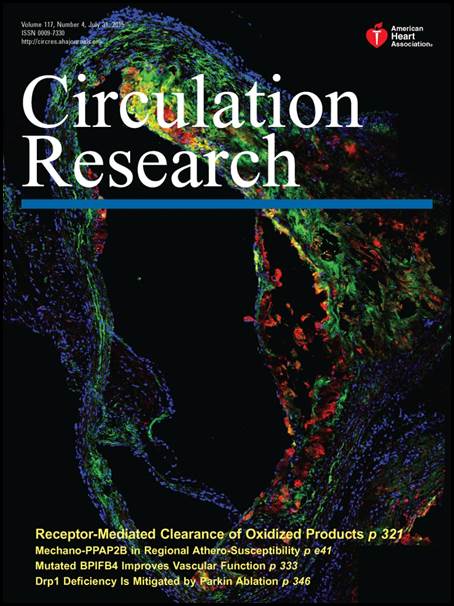
Picture taken by X. West, multiple images reconstructed by R. Cull / Cleveland Clinic
Project Highlight: We have demonstrated a novel mechanism of recognition and clearance of oxidized lipid metabolites, which were previously believed to be end-products of oxidative process. These oxidized lipid metabolites accumulate in atherosclerotic lesions of blood vessels, including aortas (shown on the cover). The study shows that high levels of oxidized products found in pathologies, including atherosclerosis and cancer, might be due to their insufficient clearance by macrophages.
Receptor-Mediated Mechanism Controlling Tissue Levels of Bioactive Lipid Oxidation Products (Circulation Research, 2015, Kim YW … Byzova TV)
Cancer and inflammation-associated thrombosis
In many cancers the leading cause of morbidity and mortality is cancer-associated thrombosis, also known as Trousseau’s syndrome. While our anti-cancer therapeutic strategies have improved, resulting in a longer life span of cancer patients, the problem of thromboembolism becomes even more important.
While numerous clinical studies emphasize how important this problem is, very little is known about the mechanisms behind it. While preventing blood clots is important, it is equally critical to maintain the body's ability to form clots when necessary to control bleeding. Cancer treatments, such as surgery or invasive procedures, increase the risk of bleeding. In such situations, it is crucial to ensure that the patient's hemostatic function is intact to prevent excessive bleeding and its associated complications.
We have been working for years on cancer thrombosis and on the mechanisms of tumor communications with various organs, including premetastatic and metastatic interactions. We demonstrated metastatic cancers are able to affect their future metastatic sites, such as bone. We also found that this communication is mediated by circulating platelets. In a recent study we show that aggressive tumors release small extracellular vesicles (sEV) that in turn are engulfed by platelets. Uptake leads to accumulation of cancer cell-specific markers- thus we can use platelets for liquid biopsy and cancer staging. We show this using blood from patients with prostate cancer prior to and after radical prostatectomy.
Platelet activation is a key for thrombosis. Platelets are hyperreactive in cancer patients and very easily aggregate. We show that in cancer platelet activation is mediated by the exosome membrane protein- CD63 and transmembrane receptor-like protein tyrosine phosphatase alpha (RPTPα) on platelets. sEV reprogram platelets making them hyperreactive and susceptible for clotting. We delineated the entire pathway of platelet activation by cancer and show that it is distinct from the conventional pathway. This will allow us to target the cancer-dependent component.
Read more in Cleveland Clinic’s ConsultQD: Curbing thrombosis in patients with cancer
Our Team
Selected Publications
View publications for Tatiana Byzova, PhD
(Disclaimer: This search is powered by PubMed, a service of the U.S. National Library of Medicine. PubMed is a third-party website with no affiliation with Cleveland Clinic.)
1. Malinin NL, Zhang L, Choi J, Ciocea A, Razorenova O, Ma YQ, Podrez EA, Tosi M, Lennon DP, Caplan AI, Shurin SB, Plow EF, Byzova TV. A point mutation in KINDLIN3 ablates activation of three integrin subfamilies in humans. Nat Med. 2009;15(3):313-8. Epub 20090222. doi: 10.1038/nm.1917. PubMed PMID: 19234460; PMCID: PMC2857384.
2. West XZ, Malinin NL, Merkulova AA, Tischenko M, Kerr BA, Borden EC, Podrez EA, Salomon RG, Byzova TV. Oxidative stress induces angiogenesis by activating TLR2 with novel endogenous ligands. Nature. 2010;467(7318):972-6. Epub 20101003. doi: 10.1038/nature09421. PubMed PMID: 20927103; PMCID: PMC2990914.
3. Chen J, Somanath PR, Razorenova O, Chen WS, Hay N, Bornstein P, Byzova TV. Akt1 regulates pathological angiogenesis, vascular maturation and permeability in vivo. Nat Med. 2005;11(11):1188-96. Epub 20051016. doi: 10.1038/nm1307. PubMed PMID: 16227992; PMCID: PMC2277080.
4. Kerr BA, West XZ, Kim YW, Zhao Y, Tischenko M, Cull RM, Phares TW, Peng XD, Bernier-Latmani J, Petrova TV, Adams RH, Hay N, Naga Prasad SV, Byzova TV. Stability and function of adult vasculature is sustained by Akt/Jagged1 signalling axis in endothelium. Nat Commun. 2016;7:10960. Epub 20160314. doi: 10.1038/ncomms10960. PubMed PMID: 26971877; PMCID: PMC4793084.
5. McCoy MG, Nascimento DW, Veleeparambil M, Murtazina R, Gao D, Tkachenko S, Podrez E, Byzova TV. Endothelial TLR2 promotes proangiogenic immune cell recruitment and tumor angiogenesis. Sci Signal. 2021;14(666). doi: 10.1126/scisignal.abc5371. PubMed PMID: 33986920; PMCID: PMC8112454.
6. Dudiki T, Meller J, Mahajan G, Liu H, Zhevlakova I, Stefl S, Witherow C, Podrez E, Kothapalli CR, Byzova TV. Microglia control vascular architecture via a TGFbeta1 dependent paracrine mechanism linked to tissue mechanics. Nat Commun. 2020;11(1):986. Epub 20200220. doi: 10.1038/s41467-020-14787-y. PubMed PMID: 32080187; PMCID: PMC7033106.
7. Kim YW, Yakubenko VP, West XZ, Gugiu GB, Renganathan K, Biswas S, Gao D, Crabb JW, Salomon RG, Podrez EA, Byzova TV. Receptor-Mediated Mechanism Controlling Tissue Levels of Bioactive Lipid Oxidation Products. Circ Res. 2015;117(4):321-32. Epub 20150512. doi: 10.1161/CIRCRESAHA.117.305925. PubMed PMID: 25966710; PMCID: PMC4522201.
8. Yakubenko, V. P., Cui, K., Ardell, C. L., Brown, K. E., West, X. Z., Gao, D., Stefl, S., Salomon, R. G., Podrez, E. A., and Byzova, T. V. (2018) Oxidative modifications of extracellular matrix promote the second wave of inflammation via beta2 integrins. Blood 132, 78-88
9. Xiong L, Zhevlakova I, West XZ, Gao D, Murtazina R, Horak A, Brown JM, Molokotina I, Podrez EA, and Byzova TV. TLR2 Regulates Hair Follicle Cycle and Regeneration via BMP Signaling. Elife and bioRxiv. 2023 Sep 20:2023.08.14.553236. doi: 10.1101/2023.08.14.553236. PMID: 37645905. Commentary by Prelights, The Company of Biologists “A new miracle for hair loss-How TLR2 signaling fuels hair cycling”.
10. Dudiki T, Veleeparambil M, Zhevlakova I, Biswas S, Klein EA, Ford P, Podrez EA, Byzova TV. Mechanism of Tumor-Platelet Communications in Cancer. Circ Res. 2023;132(11):1447-1461. PMID: 37144446
Patents
| US Patent | Patent Title | Issue Date | First-Named Inventor |
|---|---|---|---|
| 8,080,252 | Compounds and Methods of Modulating Angiogenesis | 12/20/2011 | Tatiana V. Byzova, PhD |
| 9,981,018 | Compositions and Methods for Modulating Toll-Like Receptor 2 Activation | 05/29/2018 | Tatiana V. Byzova, PhD |
Careers
If you are interested in our research and want to learn more about joining our team, please email Dr. Byzova at [email protected].
The Byzova lab is always looking for motivated people with cell biology or translational skills (preclinical work, human studies) who wish to pursue a career in vascular biology/inflammation in academia or industry. Our main philosophy is based in teamwork. We believe that together we can always achieve more. Many lab publications are a result of collaborative work and often feature two first authors.
Postdoctoral Fellows
Our former trainees include full professors, tenured associate professors, chairs of clinical departments and successful leaders in industry. Over the last 10 years, 12 former postdoctoral fellows have advanced to independent faculty positions in various institutions. Some of our alumni include:
- P. Somanath, Full Professor, Medical College of Georgia
- O.Razorenova, Associate Professor, UC Irvine
- V.Yakubenko, Associate Professor, University of Tennessee
- A. Smith
- R. Miocinovich
- X. West
- M. Mccoy
This issue of Cleveland Clinic’s Alumni Connection (p. 37) features an interview with former trainee V. Yakubenko, now Associate Professor, University of Tennessee. While training in our lab, he received an AHA and NIH grant.
Undergraduate & Graduate Students
We remain committed to open our lab to undergraduates (summer students that often stay in the lab for several years) and engage them in long-term research experiences. These students perform discovery research under the direct tutelage of a postdoctoral fellow and spend 1-3 years in the lab.
Over the last 10 years we have had over a dozen undergraduates, with their contributions acknowledged in publications. Selected examples from 2022 publications (former trainees are bolded):
Xiong L, McCoy M, Komuro H, West XZ, Yakubenko V, Gao D, Dudiki T, Milo A, Chen J, Podrez EA, Trapp B, Byzova TV. Inflammation-dependent oxidative stress metabolites as a hallmark of amyotrophic lateral sclerosis. Free Radic Biol Med. 2022;178:125-33. Epub 20211203. doi: 10.1016/j.freeradbiomed.2021.11.031. PubMed PMID: 34871763; PMCID: PMC8744315.
Dudiki T, Nascimento DW, Childs LS, Kareti S, Androjna C, Zhevlakova I, Byzova TV. Progressive skeletal defects caused by Kindlin3 deficiency, a model of autosomal recessive osteopetrosis in humans. Bone. 2022;160:116397. Epub 20220325. doi: 10.1016/j.bone.2022.116397. PubMed PMID: 35342016; PMCID: PMC9133165.
Training at Lerner Research Institute
Our education and training programs offer hands-on experience at one of the nationʼs top hospitals. Travel, publish in high impact journals and collaborate with investigators to solve real-world biomedical research questions.
Learn MoreResearch News

Through investigating how to block RCA damage from oxidation, investigators plan to define a new pathway in Alzheimer’s disease.

Recently published research from Cleveland Clinic sheds light on how tumors release particles into the bloodstream, stimulating the formation of blood clots.

Dr. Byzova found that microglia sense and respond to changes in tissue stiffness, a hallmark of many neurological and retinal disorders, and identified a related signaling cascade that may be targeted to correct microglial response and potentially treat the associated disorders.